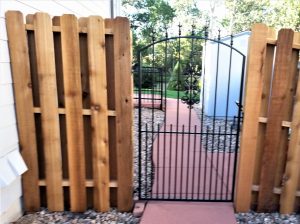Featured

When intending to mount a fence around your residential property, one of the initial steps is comprehending the permitting requirements in your location. Below's what you need to recognize regarding obtaining the essential permits for your fencing installment.
Why Do You Required an Authorization for a Fencing? A license is often needed for fence installments to make certain conformity with regional structure codes, zoning regulations, and safety and security guidelines. Permitting aids neighborhood authorities preserve harmony in neighborhood visual appeals, safety, and environmental factors to consider. It also makes certain that the fencing does not conflict with utility lines or public rooms, and that it sticks to elevation and limit limitations.

Typical Authorizations Needed for Fencing Setup. Structure Permit. The majority of locations require a structure license for fencing setup, especially if the fence goes beyond a specific elevation (generally over 6 feet) or is made from non-standard products. This authorization guarantees that your fencing abides by neighborhood building regulations. In some areas, the structure department will certainly check the website to make sure that the fencing satisfies safety and architectural requirements.
Zoning Authorization. Zoning licenses are designed to make certain that your fence sticks to neighborhood zoning regulations, consisting of problems from residential property lines, easements, and rights-of-way. Zoning laws differ from city to city, and sometimes, your fencing might need to be set back a certain number of feet from the pathway or road. A zoning permit may additionally be essential if your fence is in a historical district or various other specially designated areas.

Fence Authorization. In some areas, a details "fence license" may be needed. Some cities restrict chain-link fences in front yards or have details guidelines for personal privacy fences.
HOA Authorization. You might require authorization prior to installing a fencing if your home is component of a homeowners organization (HOA) HOA standards often consist of particular rules regarding the kind, elevation, shade, and products for fencings to preserve the neighborhood's aesthetic appeals. HOA regulations can be more stringent than city codes, so constantly inspect their standards before moving on.
Easement or Utility Permits. If your fence will be near or throughout an easement (such as an energy easement), you might require to obtain authorization from the utility business or other entities that control the land. This is especially crucial if you prepare to mine fence messages, as it ensures you won't damage underground energies like gas, power, or water lines.
How to Discover Out What Allows Are Required. The very best method to establish which permits are essential for your fencing installation is to contact your regional building division or community workplace. They can supply you with specific info regarding needs in your area. Here are a few steps you can require to figure out:
Examine the City or Area Web site: Several regional federal governments give details concerning fence setup allows online. Try to find structure or zoning areas on their website. Call or Visit City Government Offices: If the info is not conveniently available online, calling or visiting the neighborhood workplace in person can clarify what's required. Seek Advice From a Specialist Contractor: If you're uncertain or overwhelmed by the procedure, a neighborhood contractor or fencing installment firm can aid in navigating the permitting process, as they recognize with neighborhood policies. What Occurs If You Do Not Obtain a License? Falling short to acquire the necessary licenses can bring about a selection of consequences. In several locations, you can face penalties, and your fencing could be gotten to be gotten rid of. Furthermore, if you sell your residential property in the future, the lack of appropriate permits can be a warning for buyers and affect the sale. Permitting makes certain that your fencing is compliant and assists avoid future problems.
Conclusion. Before setting up a fence around your property, it's vital to examine whether a permit is needed in your location. Structure permits, zoning authorizations, HOA authorization, and utility consents may all play a role in your fencing installment procedure. Putting in the time to study and obtain the essential authorizations will certainly not only guarantee that you're following neighborhood regulations, but additionally assist secure your investment and preserve the honesty of your building.
Latest Posts
Unlock WyHy FCU – Top Benefits for Your Money Goals
Published May 27, 25
1 min read
Don’t Miss Limited-Time Auto Repair Offers in Chicago at Montclare Auto Repair
Published May 25, 25
1 min read
Find Out Cut Costs on Car Maintenance with Montclare Auto Repair’s Special Deals
Published May 24, 25
1 min read
More
Latest Posts
Unlock WyHy FCU – Top Benefits for Your Money Goals
Published May 27, 25
1 min read
Don’t Miss Limited-Time Auto Repair Offers in Chicago at Montclare Auto Repair
Published May 25, 25
1 min read
Find Out Cut Costs on Car Maintenance with Montclare Auto Repair’s Special Deals
Published May 24, 25
1 min read